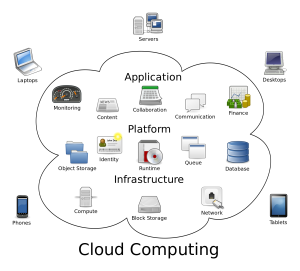Cloud computing has become a hot topic as of late, with big-name tech companies like Google, Amazon, HP, Microsoft and Apple venturing into these uncharted territories. The term “cloud computing” refers to the use of a remote, Internet-connected network of computers that manages, processes and stores data. Before you invest in a cloud computing service though, you should familiarize yourself with its pros and cons. 
Cloud Computing Pros:
- Access from anywhere – cloud computing allows companies to access their data from any location in the world, assuming the employee has an active Internet connection. Storing data locally means you have to be physically near the computer, but cloud computing allows you to access data from any connected device.
- Backups – another key benefit of cloud computing is the simple fact that data is automatically backed up. As the saying goes “hope for the best but prepare for the worst.” With cloud computing, you can rest assured knowing that your data is stored on the cloud, where you can download/access it should your original copy disappear.
- Eco-friendly – you might be surprised to learn that cloud computing is eco-friendly. Cloud computing services are designed to use hardware resources more efficiently than traditional computer networks; thus, reducing its power consumption.
- Cross-device compatibility – cloud computing services are often designed to work with a wide range of different devices, including traditional desktops and laptops, as well as Macs, tablet computers, iOS smartphones, Android smartphones, Windows smartphones, and more.
Cloud Computing Cons:
- Security risks – one of the greatest drawbacks to cloud computing is its inherit security risks. When a company wishes to place its data on the cloud, it must send the data to a third-party cloud company. It’s then the cloud company’s responsibility to keep the data secure, which isn’t always an easy task being that it’s accessible online.
- Downtime and outages – when the cloud goes down, whether it’s for maintenance, bug fixes, or anything else, all of its users will be temporarily locked out until it’s back online. This is particularly problematic for large companies with hundreds or thousands of employees who rely on cloud computing.
- Control limitations – cloud computing services run on third-party environments owned and operated by cloud companies. As a result, companies that use cloud computing services often have little control over the function of both the hardware and software. If you’re looking for a fully customizable way to share data throughout your company, you’ll probably want to skip cloud computing for this very reason.
 Offtek Blog Your source for everything memory
Offtek Blog Your source for everything memory
